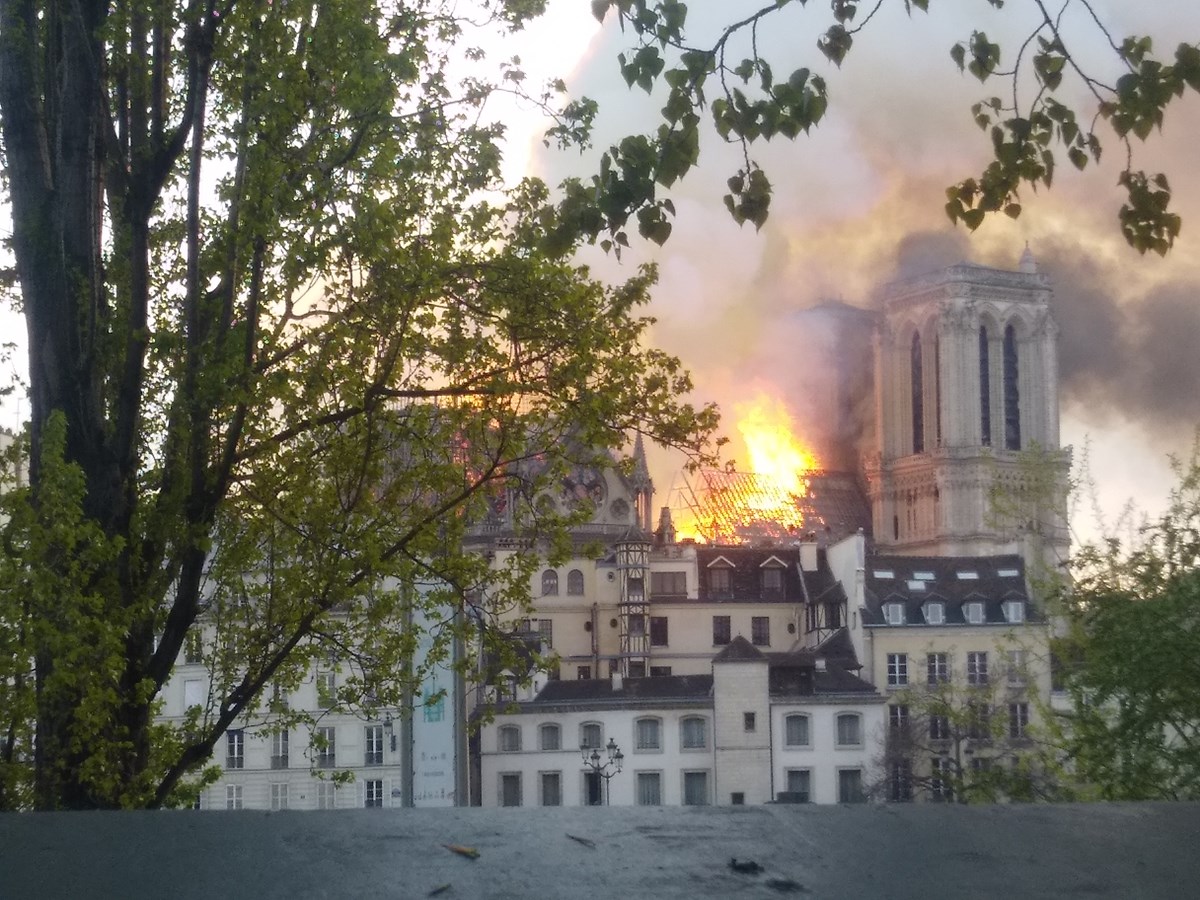“Things fall apart, the centre cannot hold,” so said Irish poet W.B. Yeats in his infamous poem, “The Second Coming.”
Although written in 1919 in the wake of post-WWI Europe, the poet's words still hold significance today. This is largely because the idea in Yeats’s poem is not confined to a particular historical period, but a physical law of the universe—the all-consuming force of entropy.Efforts to put out the fire resulted in, at one point, at least 400 firefighters simultaneously working to combat the disaster.
And nowhere is entropy more evident than the burning and collapse of the hallowed Notre-Dame Cathedral in Paris, France.
During the evening on Monday, April 15, 2019, the more than 850-year-old cathedral caught fire, causing the collapse of its iconic—and delicate—spire. According to a French fire official, the cathedral was saved from “total destruction,” a relief after many watched the blaze in fear that nothing could be done to prevent its burning to the ground. Efforts to put out the fire resulted in, at one point, at least 400 firefighters simultaneously working to combat the disaster. Nobody was killed subduing the flames, but one fireman reportedly was injured.
Tragic Historical Event
The great tragedy is that the building holds immense historical significance. Built in the 12th and 13th century over a 182-year period, the cathedral serves as an esteemed landmark for the city of Paris, the country of France, and the rest of the world. It was completed during the reign of King Louis VII, has survived desecration during the French Revolution, was the setting of Napoleon’s coronation and wedding, was the subject of Victor Hugo’s 1831 novel The Hunchback of Notre-Dame, and serves as the cathedral of the Archdiocese of Paris.
So when a building so deeply cherished by not only the French but the greater human populous nearly burns to the ground, you can guess that people will view the event as tragic. Greater than “some building,” the cathedral holds near person-like significance, as if it is an actual part of people and their larger human history (such is the nature of symbols).
Addressing the situation, French President Emmanuel Macron had this to say:
Notre-Dame is aflame. Great emotion for the whole nation. Our thoughts go out to all Catholics and to the French people. Like all of my fellow citizens, I am sad to see this part of us burn tonight. https://t.co/27CrJgJkJb
— Emmanuel Macron (@EmmanuelMacron) April 15, 2019
Macron added “This is the place where we have lived all of our great moments, the epicenter of our lives,” he added. “It is the cathedral of all the French.”
One Frenchman, a 45-year-old marketing director named Pierre Guillaume Bonnet, said that “It is like losing a member of one’s own family.”
“This belonged to the whole world, and now it is disappearing,” said 33-year-old film producer Mohamed Megdoul.
Angelique de Almeida, 32, said, “We are going to lose her, everything is up in flames. We lose this, we lost Paris. It is apocalyptic.”
The burning of the building is indeed tragic, but perhaps there is a greater lesson that can be extracted: that things fall apart, that the nature of existence is ephemeral. But not that we should fear these things, that we should embrace fate whole-heartedly and reflect on it regularly. To deal with the reality of entropy, we can find solace in the Stoic concept of Momento Mori.
What Is Entropy?
Taken literally, the second principle of thermodynamics states that the entropy of a closed system will always increase, which means that systems and objects will always change into a more disordered state.
Used in a more philosophical sense, like systems, objects over time have the tendency to break down, and, subsequently, so do living things, like humans and animals. It is summed up in this way:
Indeed, the very process of construction and creation foreshadow destruction and decay. The palace of today is tomorrow’s ruin, the maiden of the morning is the crone of the night, and the hope of a moment is but the foundation stone of everlasting regret.
Though the previous quote is about a fictional god of decay and disorder from the Warhammer universe, it’s significance is universal. As humans, we try to create structures that outlast us, perhaps in an egoic attempt to live forever, though we know that wish is at odds against reality. It is a natural tendency to want to preserve something against this all-consuming force (think gardening, raising children, woodworking, etc...). This is not to say that the Notre-Dame Cathedral, amongst other things, is not worth creating or preserving, it is simply to suggest that we must all admit that things cannot last forever. At some point, even sacred monuments will cease to exist.
What to Do about It
The initial contemplation of entropy and our finite nature of existence can be terrifying. In fact, it is a great source of anxiety for most humans. (This might not bother you yet, but a time will come when it does.) But I agree with Carl Jung that there is a value to anxiety, it means there is a problem in your life that is begging for attention so you can solve it. Here’s what he said in The Symbolic Life:
I am not altogether pessimistic about neurosis. In many cases we have to say, ‘Thank heaven he could make up his mind to be neurotic.’ Neurosis is really an attempt at self-cure…It is an attempt of the self-regulating psychic system to restore the balance, in no way different from the function of dreams—only rather more forceful and drastic.
In Civilization in Transition, he also said, “We should not try to 'get rid' of a neurosis, but rather to experience what it means, what it has to teach, what its purpose is.”
So in becoming anxious after thinking about death, it might be a sign that there is something we have to alter in our lives, perhaps a mere change in perspective. The solution, as some might think, is not searching for the Fountain of Youth, it is the acknowledgment and acceptance that death will come and you will cease to be.
This is why Stoic philosophers believe in the concept of Memento Mori, Latin for “remember that you will die.” The Stoics, even going all the way back to Socrates, believe that you should actually ponder your own death frequently. This might seem silly to some. You might ask, “Why would I want to think about something so awful that causes me such anxiety?” To this, the Stoic might respond, Is it sillier to hide from reality or to acknowledge it? There is no escaping reality, there is only its acceptance.
After pondering our own mortality, it should cause us not to retreat in anxiety, but to put our current affairs and orders in perspective. Knowing that we are more mortal, we are more keen to focus on the present tasks at hand, and quite literally live each day like we’re dying (because we are).
As Seneca said,
Let us prepare our minds as if we’d come to the very end of life. Let us postpone nothing. Let us balance life’s books each day… The one who puts the finishing touches on their life each day is never short of time.
Similarly, Epictetus encouraged his students to “Keep death and exile before your eyes each day, along with everything that seems terrible—by doing so, you’ll never have a base thought nor will you have excessive desire.”
Embracing the concept of Memento Mori, we are able to put this crazy thing called life into its proper perspective. It should serve as a reminder to be the best possible people we can be, to not let things go unsaid, to truly care for the ones we love, and to live as if we have already died. For we never know when we will meet our fate.
In his Meditations, Stoic emperor Marcus Aurelius wrote, “You could leave life right now. Let that determine what you do and say and think.”
We must confront and accept our mortality by remembering that we might die at any moment. Learn to pursue what truly matters.
It is no doubt that the burning of the esteemed Notre-Dame Cathedral is a tragic circumstance. When we think about sacred structures having the potential to catch fire and collapse, we should remember that nothing is able to outlast nature. “Things fall apart, the centre cannot hold.”
The way forward is not to retreat into anxious solitude, afraid of the ephemeral nature of our own existence. What we must do is confront and accept our mortality. We must remember that we might die this very moment. Let that color your world by learning to pursue what truly matters. To accept the nature of reality instead of being at odds against it will afford you a much more stable life, both internally and externally.

